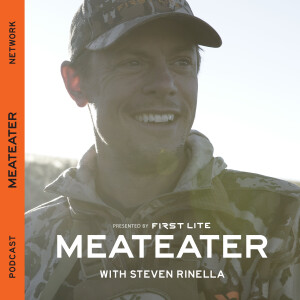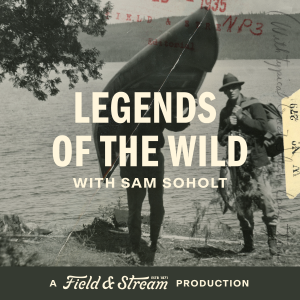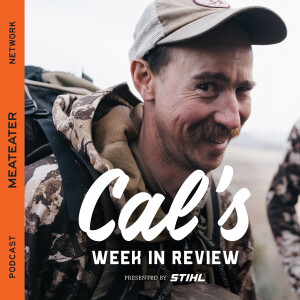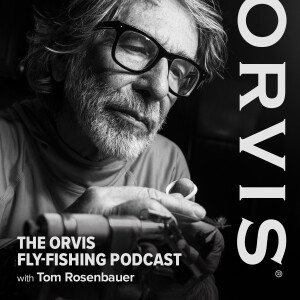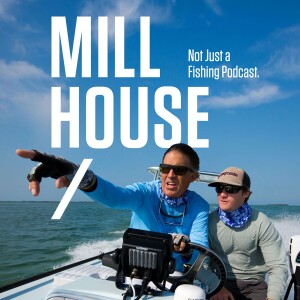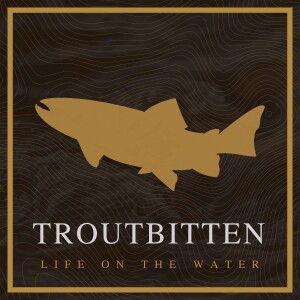

Episode List

The Blue Liner's Bible -- Finding the Right Water
We're back with Season 16, with episode two of the Blue Liner’s Bible. This one is all about finding the right water.We mean this in two different ways. First, you need to find a small stream that has public access (or you have private permission). But the stream also needs cold water and a good population of trout (hopefully they’re wild trout).That’s the first thing — find a good stream to fish. And honestly, that may not be as easy as it sounds.If you do start to explore new territory and get into the small stream game, you’ll quickly understand what we mean, first hand, when we say that the exploration is part of the reward. The failure to find good water on one trip makes the next trip, where you find what becomes one of your favorite places in the world, even more specialSo we’ll talk about that tonight — how to choose your next adventure. Identifying primary and secondary water, and kind of how to balance that risk vs reward.Meaning, you could fish the small stream that everyone talks about in Montana or Pennsylvania, because you can be sure that trout are present in good numbers. But would you rather take the chance on the stream that no one mentions? It has all the variables you’re looking for in your research, and because it has no name, you can be sure no one else will be thereUnderstanding those variables and knowing good sources for research is part of our topic here tonight.And then, the other part of finding good water is from an on-stream perspective. Once you’re there, what section should you choose? And even within that section, what water types should you target the most? Do you expect trout in the deep pools or the riffles, in the fast water, or the slow, shady, deep undercuts?A lot goes into these choices as well. Much of it is seasonal. Some of it is about matching your tactics and your fly choices, and another part is just experience and instinct. Again, all of this stuff is why we love small stream fishing.None of it is laid out for you. A good fly shop will not lead you to these places. And even a good friend, with the best intentions, may not have even half the intel that you really need for a good day of small stream fishing. Like we said last time, the small stream game is do-it-yourself in nature.So, that’s what we have lined up. My friend, Austin Dando, joins me for a good look at finding the right small stream water.ResourcesREAD: Troutbitten | Category | Small Stream FishingREAD: Troutbitten | Tag | Small Stream FishingPODCAST: Troutbitten | What to Love About Small Stream Fishing - S7,Ep6VIDEO: Troutbitten | Home WatersVisitTroutbitten WebsiteTroutbitten InstagramTroutbitten YouTubeTroutbitten FacebookThanks to TroutRoutes:Use the code TROUTBITTEN for 20% off your membership athttps://maps.troutroutes.com Thanks to SkwalaUse the code, TROUTBITTEN10 for 10% off your order athttps://skwalafishing.com/

The Blue Liner's Bible --The Good and Bad of Small Stream Fishing
With cold flows and eager trout, mountain water and small stream fishing can provide the perfect setup, the perfect escape, if you’re willing to put in the effort. There are some truly wonderful things about small stream fishing, and learning to work these waters teaches us everything we need to know about fishing any trout water. But the challenges can turn many people off as well.Small stream fishing can be tough. In truth, you cannot fish the same way as you fish an average river. You cannot use the same gear, the same approach or the same mindset and expect to have the same success. Things are different on small waters.So begins the Troutbitten Blue Liner's Bible series. We've had this idea in the works for many years. I've created the rough outline in book form, but let's kick off the Blue Liner's Bible with this podcast skills series.In this first episode, Austin Dando and work through the advantages and disadvantages, the good and the bad, with an honest look at what you can expect from small stream fishing — the challenges and the rewards. And in the following episodes of this series, we’ll talk about water types, gear and tactics. We'll also tell a few stories.ResourcesREAD: Troutbitten | Category | Small Stream FishingREAD: Troutbitten | Tag | Small Stream FishingPODCAST: Troutbitten | What to Love About Small Stream Fishing - S7,Ep6VIDEO: Troutbitten | Home WatersVisitTroutbitten WebsiteTroutbitten InstagramTroutbitten YouTubeTroutbitten FacebookThanks to TroutRoutes:Use the code TROUTBITTEN for 20% off your membership athttps://maps.troutroutes.com Thanks to SkwalaUse the code, TROUTBITTEN10 for 10% off your order athttps://skwalafishing.com/

The Airing of Grievances -- Four
Welcome to the fourth annual Airing of Grievances on the Troutbitten Podcast. Buckle up. Because it’s time to clear the air about a few things, to complain about some other things and get all the frustrations out in the open.We look forward to this episode every year, because honestly, it’s a lot of fun. I know that listeners anticipate this one as well, and just like last year, we have a bunch of guest grievances to add to the mix.We’re here to complain. Why? Because acknowledging the absurdity of some stuff in the fly fishing world can do a lot of good. And because it’s fun and probably healthy to get things out in the open once in a while. And we start to realize that the stuff that bothers us, seems to bother a lot of other people too. The truth is, we’ve seen a lot of good changes in our industry in the last few years as well. And some of that is about topics that made it into our grievances podcasts three or four years ago. Most people really are being more discreet about spot burning, for example. I think the message is out there, that hey, spot burning isn’t cool, and it kind of shows your inexperience if you do it. I honestly see better angler etiquette out there as well — all the way around. Sure . . . I know, not everywhere. But overall, I think the messages about giving other anglers space, about how to hold a trout and other ethical guidelines are starting to hit home. Good things are beginning to stick. This is the best part of social media and the large community of anglers. The truth is, most people really want to do the right things — or at least, they don’t want to harm others or ruin another angler’s fishing experience. And a podcast like this can really help to give voice to some of the supposedly unspoken or unwritten rules of fly fishing.So yeah, we think that airing of grievances really is beneficial to the overall scene.This all started because most of us are big Seinfeld fans. And part of Frank Costanza’s Festivus holiday is what he calls the airing of grievances, where the whole family sits around the dinner table and lists what they don’t like about one another. “I gotta lotta problems with you people, and now . . . you’re gonna hear about it . . ."VisitTroutbitten WebsiteTroutbitten InstagramTroutbitten YouTubeTroutbitten Facebook Thanks to TroutRoutes:Use the code TROUTBITTEN for 20% off your membership athttps://maps.troutroutes.com Thanks to SkwalaUse the code, TROUTBITTEN10 for 10% off your order athttps://skwalafishing.com/

Is Gen X the Greatest Fly Fishing Generation?
We talk a lot about our frame of reference in fly fishing. Wherever you get into the game, a lot of your baseline is set by whatever is popular or widely accepted at that moment in time. My friend, Matt Mickey, recently argued that Gen X anglers are uniquely positioned, that this generation has experienced development and had a wide variety of influences that will never be duplicated.We’ve learned through every form of media. We grew up in a time where good information was sparse, and most of us are largely self-taught. So it makes me wonder, will that kind of experience ever happen again? Meaning, fifty years from now, when the twenty-somethings are seventy-something, will they have the same depth of experience? Sure, they’ll have time on the water, but will they be missing some important things? And if, let’s say, modern anglers new to the game are missing some things, is it possible to go back and get them?That's what this episode is all about.My friends, Trevor Smith and Matt Mickey join me for a great discussion.ResourcesREAD: Troutbitten | How To Stay in the Fly Fishing Game for a LifetimeREAD: Troutbitten | Life On the WaterVisitTroutbitten WebsiteTroutbitten InstagramTroutbitten YouTubeTroutbitten Facebook Thanks to TroutRoutes:Use the code TROUTBITTEN for 20% off your membership athttps://maps.troutroutes.com Thanks to SkwalaUse the code, TROUTBITTEN10 for 10% off your order athttps://skwalafishing.com/

Caught, Lost and Missed Trout -- Keeping Track
So . . . how was it? How many did you catch? This is always the question for every fisherman, right? Whether I’m talking to my friends about a fishing trip from last week, or as I walked in the door this evening, my wife asked the same question — how many fish did you catch?It’s a fair question. Because that’s the goal out there (usually). We go fishing to catch fish. But the answers we give can also reveal a different story.“Well, I caught eight this morning, but I missed another handful underneath. And when I was fishing dry flies, I had a few refusals. While fishing streamers, another three fish slammed my fly but didn’t eat it. And I lost the biggest trout of the day when he popped off during the fight.”Every angler has these same kinds of stories.So I think we’d all agree that the primary goal out there — the first and most important goal of fishing — is to fool a fish. To make that trout believe that what you’re offering is worthwhile — to trick a trout. Honestly, I think that’s a large part of why most of us choose trout fishing in the first place — because as a species, they're picky and hard to fool.So we convince a trout or make them curious enough to eat the fly (or at least almost eat it). But then . . . as we all know, what happens next is variable. Sometimes we’re late on the hookset, sometimes trout reject the fly at the last second, or maybe the fish wins a quick battle and spits the fly. But all of those incidentals don’t change the fact that we fooled a fish, even though it didn’t end up in the net. We achieved that primary goal.I think everyone here counts fish to some extent. But what are we really keeping track of, and why? I like to say that every fisherman counts. I mean, you know if you catch zero, one or two trout, right?I keep track of things as a measurement of what’s working and what is not. And to me, the stats are a lot more detailed than just fish to the net. What a trout ate, where he ate it, how he took the fly and how was I fishing the fly when he ate it? Those stats matter too.Long ago, while night fishing, I started keeping track of trout caught, trout lost, and trout missed. I still do this, and as I said a few minutes ago, I think most anglers do this to some extent. The count doesn’t need to be perfect or precise. But when we miss a trout, that’s good information, because we fooled a fish. And when we lose a trout, we can be even more sure that we gained their interest.So caught, lost and missed. Why do we catch ‘em. And why do we miss or lose some trout? More importantly, what does that tell us, or how does it inform our next change?That’s what we’re here to talk about tonight.My friends, Matt Grobe, Bill Dell and Josh Darling join me for a great discussion.ResourcesREAD: Troutbitten | Nobody Home, Nobody HungryPODCAST: Troutbitten | Why Do We Miss Fish, and Why Do We Lose Fish on a Fly? S3, Ep11VisitTroutbitten WebsiteTroutbitten InstagramTroutbitten YouTubeTroutbitten Facebook Thanks to TroutRoutes:Use the code TROUTBITTEN for 20% off your membership athttps://maps.troutroutes.com Thanks to SkwalaUse the code, TROUTBITTEN10 for 10% off your order athttps://skwalafishing.com/
Create Your Podcast In Minutes
- Full-featured podcast site
- Unlimited storage and bandwidth
- Comprehensive podcast stats
- Distribute to Apple Podcasts, Spotify, and more
- Make money with your podcast
